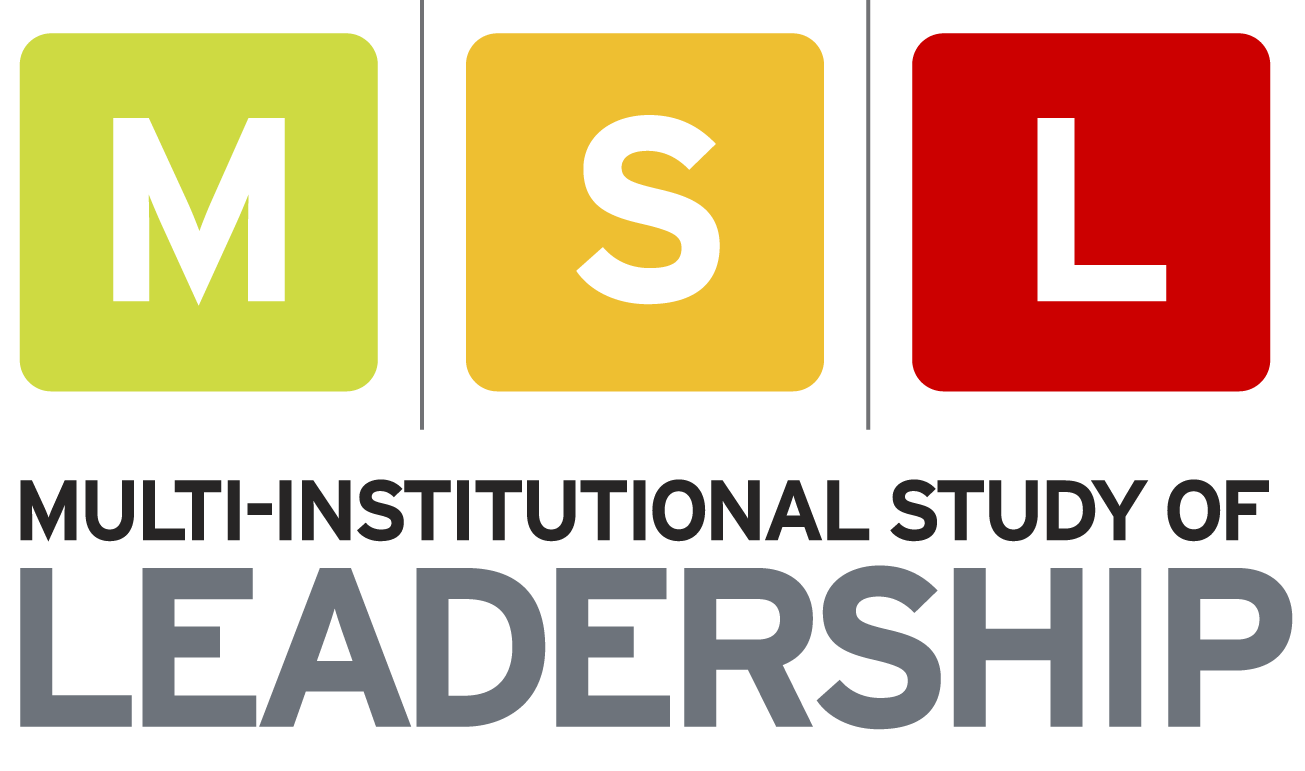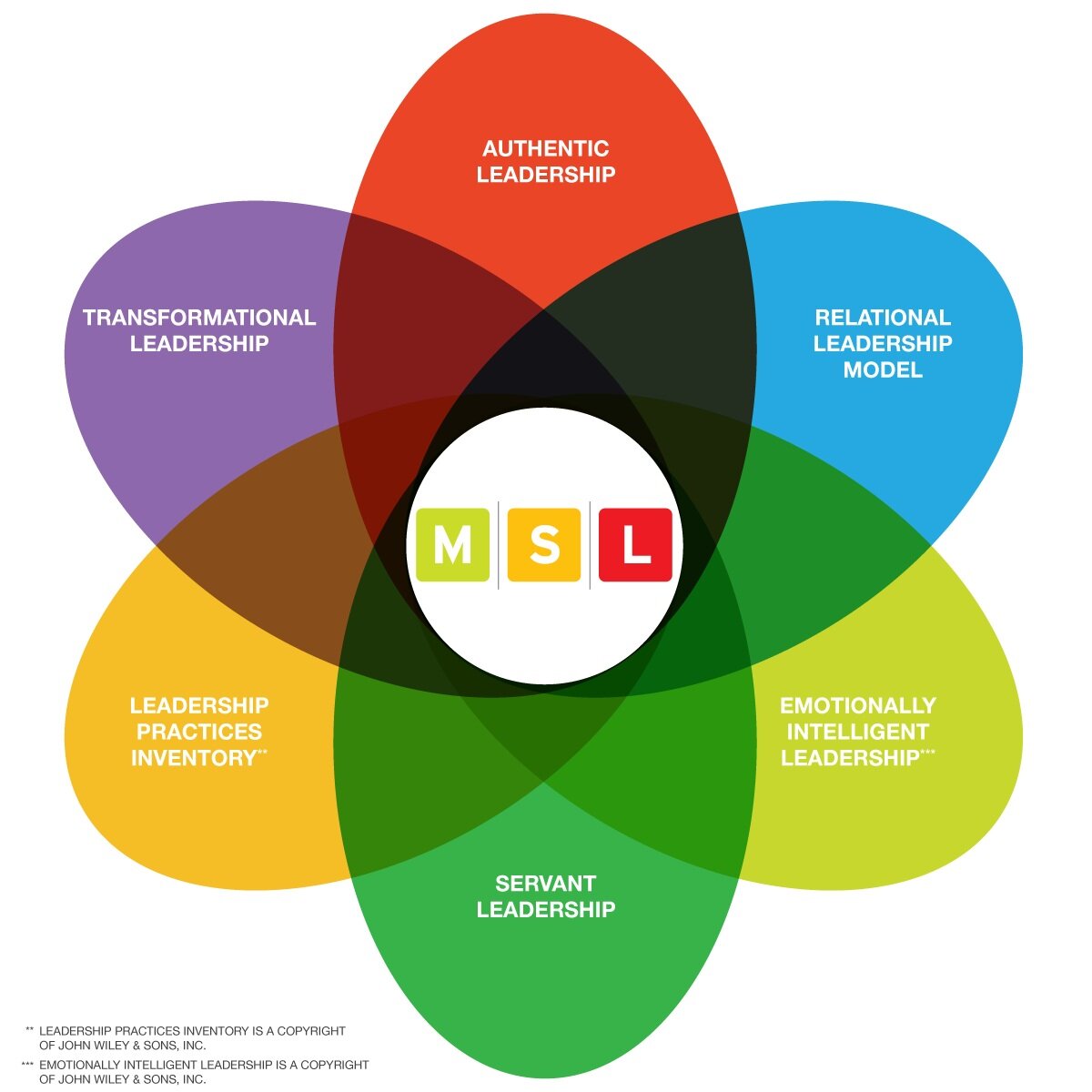More than the Social Change Model
The original theoretical framework for the MSL was the Social Change Model of Leadership Development (SCM; HERI, 1996). The SCM measures socially responsible leadership capacity defined as “a purposeful, collaborative, values-based process that results in positive social change” (Komives, Wagner, & Associates, 2009, p. xii).
The MSL theoretical framework has evolved to capture the increasing complexity of the study.
The current theoretical framework is still nested in the values of the SCM, but draws from a much wider set of theoretical bases.
This includes:
Contemporary Leadership Theory– Research from MSL has demonstrated that post-industrial theories of leadership have much in common. Thus, the theoretical framework now draws on key dimensions from a wider range of contemporary theories.
Social Psychology & Human Development– Research from MSL points to the complexity of developmental processes. Contributing to leadership development involves much more than simple skill-building. As such, the theoretical frame relies heavily on insights from psychological and human development theories to inform the study.
Critical & Justice–Based Perspectives– The MSL design has always attempted to model the values of social justice on which the SCM is predicated. This has led to increasing attention to design elements that draw on critical and justice-based perspectives.
| Model | Constructs | Does MSL Measure? | Direct or Indirect | How? |
| Authentic Leadership | Self-Awareness | ✔ | Directly | ✔ Consciousness of Self ✔ Collective Racial Esteem ✔ Motivation ✔ Self-Directed Learning ✔ Resiliency |
| Internalized Moral Perspective | ✔ | Directly | ✔ Congruence ✔ Commitment ✔ Resiliency ✔ Cognitive Skills | |
| Balanced Processing | ✔ | Directly | ✔ Cognitive Skills ✔ Social Perspective Taking | |
| Relational Transparency | ✔ | Indirectly | ✔ Consciousness of Self ✔ Leadership Efficacy ✔ Resiliency ✔ Congruence | |
| Relational Leadership Model | Purpose | ✔ | Directly | ✔ Commitment ✔ Common Purpose |
| Process | ✔ | Directly | ✔ Common Purpose ✔ Collaboration ✔ Controversy with Civility | |
| Inclusive | ✔ | Indirectly | ✔ Collaboration ✔ Social Perspective Taking | |
| Ethical | ✔ | Indirectly | ✔ Consciousness of Self ✔ Congruence ✔ Citizenship | |
| Empowering | ✔ | Indirectly | ✔ Collaboration | |
| Emotionally Intelligent Leadership** | Consciousness of Context | ✔ | indirectly | ✔ Belonging / Climate ✔ Cognitive Skills ✔ Social Perspective Taking ✔ Directed Learning |
| Consciousness of Self | ✔ | Directly | ✔ Consciousness of Self ✔ Collective Racial Esteem ✔ Motivation ✔ Resiliency ✔ Congruence | |
| Consciousness of Others | ✔ | Directly | ✔ Common Purpose ✔ Collaboration ✔ Social Perspective Taking ✔ Controversy with Civility | |
| Servant Leadership | Conceptualizing | ✔ | Indirectly | ✔ Common Purpose ✔ Cognitive Skills |
| Emotional Healing | ✔ | Indirectly | ✔ Social Perspective Taking | |
| Putting Followers First | ✘ | ✘ | ✘ | |
| Helping Followers Grow & Succeed | ✘ | ✘ | ✘ | |
| Behaving Ethically | ✔ | Indirectly | ✔ Consciousness of Self ✔ Congruence ✔ Citizenship | |
| Empowering | ✔ | Indirectly | ✔ Collaboration | |
| Creating Value for the Community | ✔ | Directly | ✔ Citizenship | |
| Leadership Practices Inventory** | Challenge the Process | ✔ | Indirectly | ✔ Change ✔ Cognitive Skills ✔ Leadership Efficacy ✔ Controversy with Civility |
| Create a Shared Vision | ✔ | Directly | ✔ Common Purpose ✔ Collaboration | |
| Enable Other to Act | ✔ | Indirectly | ✔ Collaboration | |
| Model the Way | ✔ | Indirectly | ✔ Congruence ✔ Commitment ✔ Resiliency | |
| Encourage the Heart | ✔ | Indirectly | ✔ Collaboration | |
| Transformational Leadership | Idealized Influence / Charisma | ✔ | Indirectly | ✔ Congruence ✔ Commitment |
| Inspirational Motivation | ✔ | Indirectly | ✔ Common Purpose ✔ Collaboration | |
| Intellectual Stimulation | ✔ | Indirectly | ✔ Controversy with Civility ✔ Common Purpose ✔ Cognitive Skills | |
| Individualized Consideration | ✔ | Indirectly | ✔ Social Perspective Taking ✔ Collaboration |
** Leadership Practices Inventory and Emotionally Intelligent Leadership are copyrighted by John Wiley & Sons, Inc.



